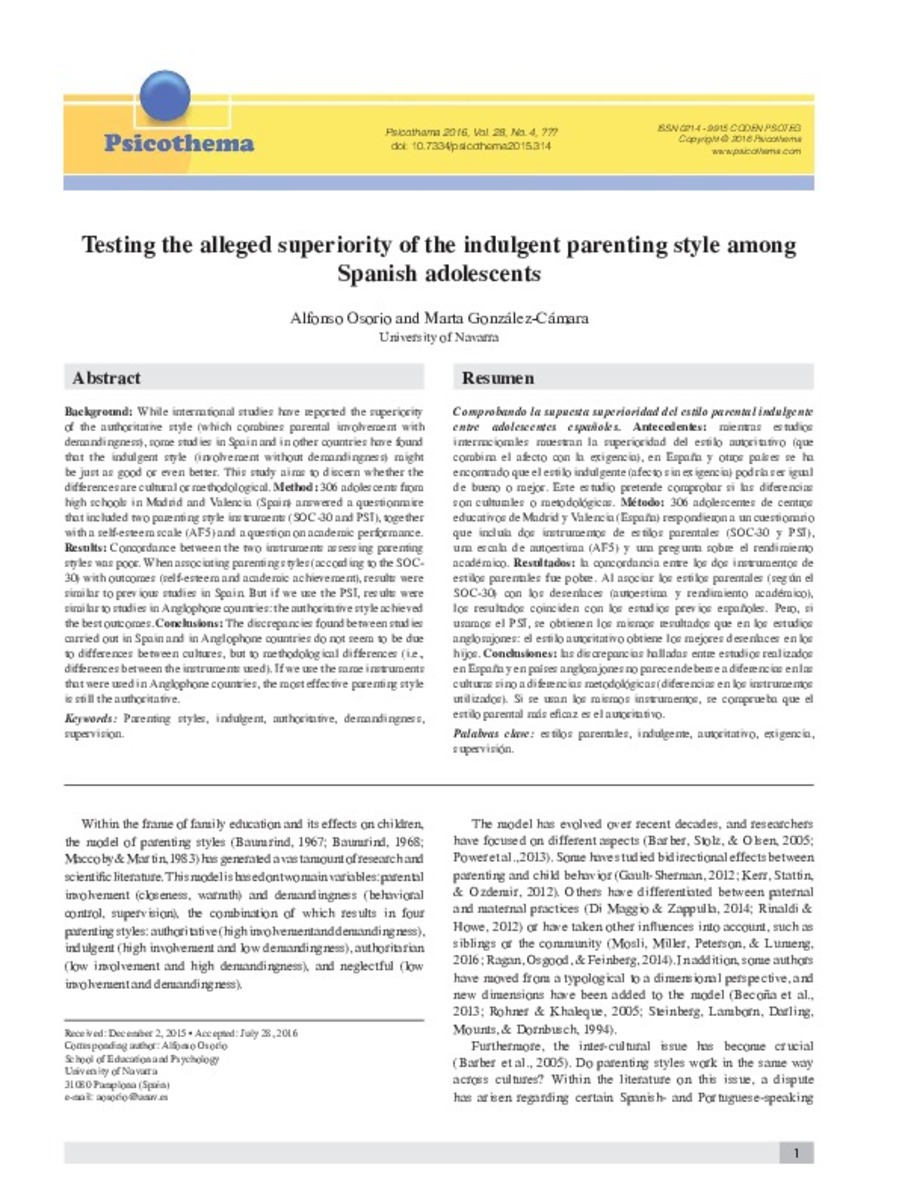Full metadata record
| DC Field | Value | Language |
|---|---|---|
| dc.creator | Osorio, A. (Alfonso) | es_ES |
| dc.creator | González-Cámara, M. (Marta) | es_ES |
| dc.date.accessioned | 2016-11-02T09:29:49Z | - |
| dc.date.available | 2016-11-02T09:29:49Z | - |
| dc.date.issued | 2016 | es_ES |
| dc.identifier.citation | Osorio, A., González-Cámara, M., “Testing the alleged superiority of the indulgent parentig style among Spanish adolescents”, Psicothema, (2016), Vol.28, N.4, pp.414-420 | - |
| dc.identifier.issn | 0214-9915 | - |
| dc.identifier.uri | https://hdl.handle.net/10171/42045 | - |
| dc.description.abstract | Background: While international studies have reported the superiority of the authoritative style (which combines parental involvement with demandingness), some studies in Spain and in other countries have found that the indulgent style (involvement without demandingness) might be just as good or even better. This study aims to discern whether the differences are cultural or methodological. Method: 306 adolescents from high schools in Madrid and Valencia (Spain) answered a questionnaire that included two parenting style instruments (SOC-30 and PSI), together with a self-esteem scale (AF5) and a question on academic performance. Results: Concordance between the two instruments assessing parenting styles was poor. When associating parenting styles (according to the SOC- 30) with outcomes (self-esteem and academic achievement), results were similar to previous studies in Spain. But if we use the PSI, results were similar to studies in Anglophone countries: the authoritative style achieved the best outcomes. Conclusions: The discrepancies found between studies carried out in Spain and in Anglophone countries do not seem to be due to differences between cultures, but to methodological differences (i.e., differences between the instruments used). If we use the same instruments that were used in Anglophone countries, the most effective parenting style is still the authoritative. | - |
| dc.description.abstract | Comprobando la supuesta superioridad del estilo parental indulgente entre adolescentes españoles. Antecedentes: mientras estudios internacionales muestran la superioridad del estilo autoritativo (que combina el afecto con la exigencia), en España y otros países se ha encontrado que el estilo indulgente (afecto sin exigencia) podría ser igual de bueno o mejor. Este estudio pretende comprobar si las diferencias son culturales o metodológicas. Método: 306 adolescentes de centros educativos de Madrid y Valencia (España) respondieron a un cuestionario que incluía dos instrumentos de estilos parentales (SOC-30 y PSI), una escala de autoestima (AF5) y una pregunta sobre el rendimiento académico. Resultados: la concordancia entre los dos instrumentos de estilos parentales fue pobre. Al asociar los estilos parentales (según el SOC-30) con los desenlaces (autoestima y rendimiento académico), los resultados coinciden con los estudios previos españoles. Pero, si usamos el PSI, se obtienen los mismos resultados que en los estudios anglosajones: el estilo autoritativo obtiene los mejores desenlaces en los hijos. Conclusiones: las discrepancias halladas entre estudios realizados en España y en países anglosajones no parecen deberse a diferencias en las culturas sino a diferencias metodológicas (diferencias en los instrumentos utilizados). Si se usan los mismos instrumentos, se comprueba que el estilo parental más eficaz es el autoritativo. | - |
| dc.language.iso | eng | - |
| dc.rights | info:eu-repo/semantics/openAccess | - |
| dc.subject | Exigencia | - |
| dc.subject | Indulgente | - |
| dc.subject | Supervision | - |
| dc.subject | Indulgent | - |
| dc.subject | Parenting styles | - |
| dc.subject | Authoritative | - |
| dc.subject | Demandingness | - |
| dc.subject | Estilo parentales | - |
| dc.subject | Autoritativo | - |
| dc.subject | Supervisión | - |
| dc.title | Testing the alleged superiority of the indulgent parenting style among Spanish adolescents | es_ES |
| dc.type | info:eu-repo/semantics/article | es_ES |
| dc.identifier.doi | http://dx.doi.org/10.7334/psicothema2015.314 | - |
Files in This Item:
Statistics and impact
Items in Dadun are protected by copyright, with all rights reserved, unless otherwise indicated.






